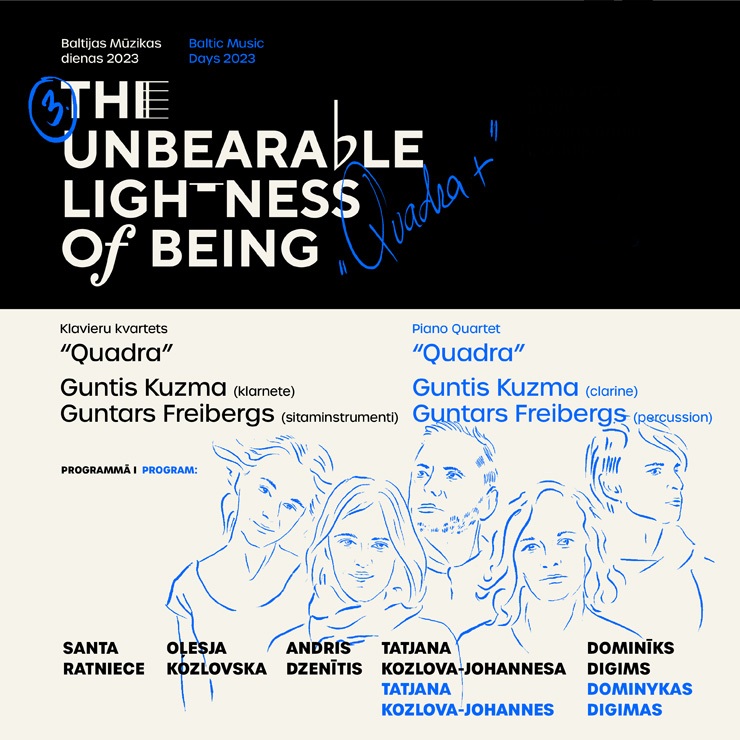The
new works for this concert are written by Santa Ratniece, one of the
most outstanding Latvian composers of our time, and Oļesja Kozlovska,
who writes music with an elegant poetic expression. Ratniece’s work is
for all six musicians, while Kozlovska’s will be performed by a string
trio and percussion ensemble. We will also hear the work "Walking
Through the Three Points" by the young Lithuanian composer Dominykas
Digimas and "Longing for Darkness" by the highly acclaimed Estonian
composer Tatjana Kozlova-Johannes.
Dominykas Digimas is one of the
most prominent composers of the younger generation of Lithuanians, and
his music has received numerous accolades and awards. The emotional
palette of his works has been described as "inward-looking and
self-reflective", Digimas's music evoking a sense of "soaring
melancholy", where transparency and intention meet. In a few words,
Digimas's music could be described as a warm vapor captured in a
photograph against a cool background. His compositions sometimes bring
together live electronics and video art as well as pre-recorded sound
with sound created live in concert.
In her music, Tatjana
Kozlova-Johannes "captures an impressive array of sounds – some
startling, some eerie, some incredibly beautiful." (
bachtrack.com)
The composer has been repeatedly successful in the International
Rostrum of Composers, and she has been awarded prizes at the new music
courses in Darmstadt. She has also collaborated with significant
ensembles such as Klangforum Wien.
__________________________
About the festival:Since
2021 “Baltic Music Days” has been organized by the Composer Unions of
Estonia, Latvia, and Lithuania. Each year the festival takes place in a
different Baltic country. The first festival, organized by the Estonian
Composers Union, took place online. The second festival was hosted in
Kaunas, the 2022 European Capital of Culture. This year, 2023, the
festival will take place from March 18-31 in Cēsis and Rīga, Latvia.
Nine concerts are planned for the festival, including the Latvian
National Symphony Orchestra performing at Cēsis Concert Hall, the State
Chamber Orchestra “Sinfonietta Rīga” performing at the Great Guild Hall
in Rīga, and the Latvian Radio Choir performing at the Jāzeps Vītols
Latvian Academy of Music.
A particularly special highlight of the
festival will be a performance by the world-famous percussion ensemble
“Les Percussions de Strasbourg” on March 19, at Cēsis Concert Hall.
The festival as a whole will include 11 world premieres by Latvian composers.
We
have borrowed this theme from the title of Czech/French writer Milan
Kundera’s well-known novel. We came to this idea at the war’s start — a
war, which unfortunately has not yet ended. A war, which has seeped into
our daily lives, into our subconscious; a war, which makes us shiver in
compassion and demands that we help as much as possible.
Amid
the war and the empathy, life and music continue, offering
opportunities for sensitivity and joy. It is unbearably heavy and light
at the same time. We have asked the festival’s composers to reflect in
their new compositions: is heaviness truly terrible, and lightness
wonderful? Is lightness positive and heaviness negative? For the moment,
it is only clear that the opposition of heaviness and lightness is the
most mysterious and meaningful of all opposites.
